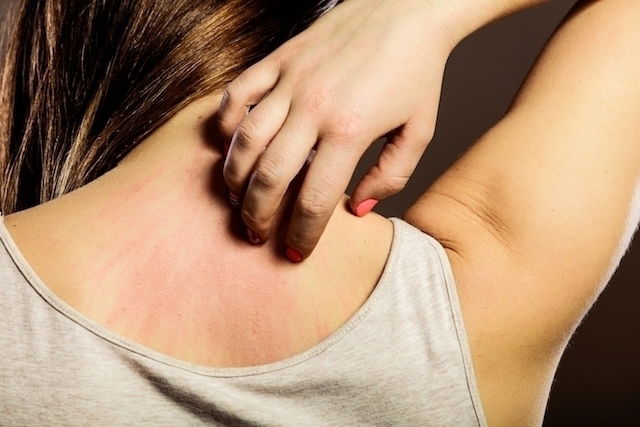Stress hives are raised, red bumps on the skin that are triggered by a strong emotional reaction. They can cause symptoms like itchiness, discomfort and swelling, and can appear suddenly. They usually resolve within 24 hours.
While other types of hives or rashes are usually the result of an immune system response to a foreign substance (like a medication, food, an insect bite or even sun exposure), stress hives usually erupt as the immune system’s response to tension or anxiety.
Psychological treatment is a very important part of treating frequent stress hives, as coping with strong emotions can help to prevent new breakouts. You should see a dermatologist for assessment if you frequently experience stress hives and are unsure of what is triggering them.

Main symptoms
Stress hives can present with symptoms like:
- Raised, swollen red bumps
- Intense itching throughout the body
- Skin swelling where the hives appear
- Skin irritation from constant scratching
- Red skin
- Burning skin
These symptoms usually appear during periods of intense stress or anxiety, and are most common in people who already have sensitive skin that is prone to rashes. Learn more about the symptoms, causes and treatment of hives.
Common causes
Stress hives are typically triggered by psychological factors, and symptoms appear mainly when the person becomes anxious or stressed. People with a preexisting tendency for developing rashes are more likely to developing stress hives.
Stress hives can often occur in people who are burned out from work, facing changes in their routine, undergoing family conflict, or have recently lost their job.
Confirming a diagnosis
Stress hives are diagnosed by family doctor or allergy specialist after a thorough assessment of the symptoms. The doctor may ask you questions about what could have triggered the rash, like certain activities, food or medications. He or she may also ask where the hives usually appear and how often it occurs.
There is not specific testing that is ordered to diagnose a stress hives, unless the doctor suspects another cause, like a food or medication allergy. Read more about how a deodorant rash can differ from stress hives.
Treatment options
Treatment for stress hives is usually aimed at relieving symptoms. Doctors will typically prescribe antihistamines to relieve itching and skin irritation. You should follow dosing instructions as prescribed by the doctor, as a high or low dose of medication can worsen symptoms or cause other problems.
Because stress hives are triggered by intense emotional fluctuations, some people may benefit from psychological counseling to cope with difficult situations. They may also find relief with soothing teas, like valerian or chamomile tea. Check out tea recipes for anxiety that you can use to help keep you calm and soothe your nerves.
Some home remedies to relieve symptoms include soaking the skin in an oat flower and lavender bath. You can also soak in a bath with Epson salt and almond oil. These ingredients contain anti-inflammatory, analgesic and soothing properties that can help to decrease skin irritation.






























